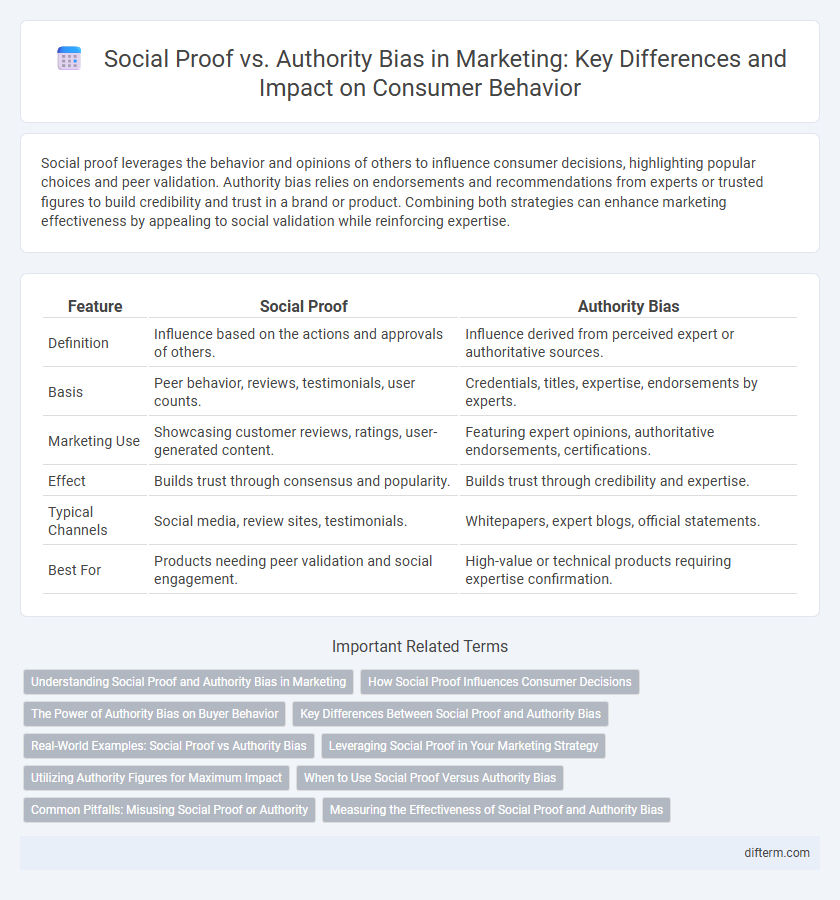Social proof leverages the behavior and opinions of others to influence consumer decisions, highlighting popular choices and peer validation. Authority bias relies on endorsements and recommendations from experts or trusted figures to build credibility and trust in a brand or product. Combining both strategies can enhance marketing effectiveness by appealing to social validation while reinforcing expertise.
Table of Comparison
| Feature | Social Proof | Authority Bias |
|---|---|---|
| Definition | Influence based on the actions and approvals of others. | Influence derived from perceived expert or authoritative sources. |
| Basis | Peer behavior, reviews, testimonials, user counts. | Credentials, titles, expertise, endorsements by experts. |
| Marketing Use | Showcasing customer reviews, ratings, user-generated content. | Featuring expert opinions, authoritative endorsements, certifications. |
| Effect | Builds trust through consensus and popularity. | Builds trust through credibility and expertise. |
| Typical Channels | Social media, review sites, testimonials. | Whitepapers, expert blogs, official statements. |
| Best For | Products needing peer validation and social engagement. | High-value or technical products requiring expertise confirmation. |
Understanding Social Proof and Authority Bias in Marketing
Social proof in marketing leverages consumer behavior by showcasing testimonials, reviews, and user-generated content to influence potential buyers through perceived popularity and consensus. Authority bias relies on endorsements from credible experts or influencers, lending trustworthiness and legitimacy to a brand or product. Understanding the distinct psychological triggers behind social proof and authority bias allows marketers to craft strategies that effectively build consumer confidence and drive conversions.
How Social Proof Influences Consumer Decisions
Social proof significantly influences consumer decisions by leveraging the behavior and opinions of others to validate choices, especially in digital marketing where reviews, testimonials, and user-generated content increase trust and credibility. Unlike authority bias, which relies on endorsements from experts or celebrities, social proof taps into the collective experience of peers, creating a sense of safety and reducing perceived risk. This psychological mechanism drives higher conversion rates as potential buyers align their behavior with popular trends and community consensus.
The Power of Authority Bias on Buyer Behavior
Authority bias significantly influences buyer behavior by leveraging perceived expertise and credibility to shape purchasing decisions. Consumers tend to trust endorsements from recognized figures or institutions, which enhances product legitimacy and encourages commitment. This effect surpasses social proof in scenarios where authoritative validation reduces uncertainty and drives confidence in the brand.
Key Differences Between Social Proof and Authority Bias
Social proof relies on the influence of peer behavior and consensus, encouraging individuals to follow the actions of others in similar situations. Authority bias depends on the credibility and expertise of an authoritative figure or institution to guide decision-making. The key difference lies in social proof stemming from collective validation, while authority bias is based on hierarchical trust and perceived expertise.
Real-World Examples: Social Proof vs Authority Bias
Brands like Amazon leverage social proof by showcasing customer reviews to influence purchasing decisions, demonstrating the power of peer validation. In contrast, luxury brands such as Rolex use authority bias by highlighting endorsements from celebrities and industry experts to build trust and credibility. Both strategies tap into psychological triggers that shape consumer behavior, with social proof emphasizing community trust and authority bias relying on perceived expertise.
Leveraging Social Proof in Your Marketing Strategy
Leveraging social proof in your marketing strategy enhances consumer trust by showcasing genuine customer testimonials, reviews, and user-generated content that demonstrate widespread satisfaction and product reliability. Highlighting real-life experiences and social validation influences purchasing decisions more effectively than authority bias, which relies on expert endorsements that may seem less relatable. Integrating social proof across digital platforms boosts engagement and conversion rates by creating a sense of community and shared trust among potential buyers.
Utilizing Authority Figures for Maximum Impact
Utilizing authority figures enhances marketing effectiveness by leveraging expert endorsements and credible testimonials to build consumer trust. Authority bias exploits audiences' tendency to believe information from perceived experts, making influencer partnerships and brand ambassador campaigns highly impactful. Strategic alignment with respected figures in the industry optimizes brand reputation and drives higher conversion rates through authoritative validation.
When to Use Social Proof Versus Authority Bias
Social proof is most effective when targeting audiences that rely on peer validation, particularly in consumer-focused markets where trust is built through reviews and testimonials. Authority bias works best in professional or specialized sectors, where endorsements from experts or industry leaders influence decision-making. Marketers should deploy social proof during the awareness and consideration phases, while authority bias is more impactful in high-stakes purchasing or compliance-driven environments.
Common Pitfalls: Misusing Social Proof or Authority
Misusing social proof often leads to exaggerated claims or fake testimonials, which can erode consumer trust and damage brand reputation. Authority bias is exploited when brands overstate expert endorsements or use unverified authorities, resulting in skepticism and diminished credibility. Both pitfalls undermine marketing effectiveness by distorting authentic influence and misleading target audiences.
Measuring the Effectiveness of Social Proof and Authority Bias
Measuring the effectiveness of social proof and authority bias involves analyzing metrics such as conversion rates, engagement levels, and trust indicators across digital platforms. A/B testing different messaging strategies that leverage testimonials, reviews, and expert endorsements helps quantify their impact on consumer behavior. Data-driven insights reveal that authority bias often drives higher initial trust, while social proof sustains long-term loyalty and peer-driven engagement.
Social proof vs authority bias Infographic

 difterm.com
difterm.com